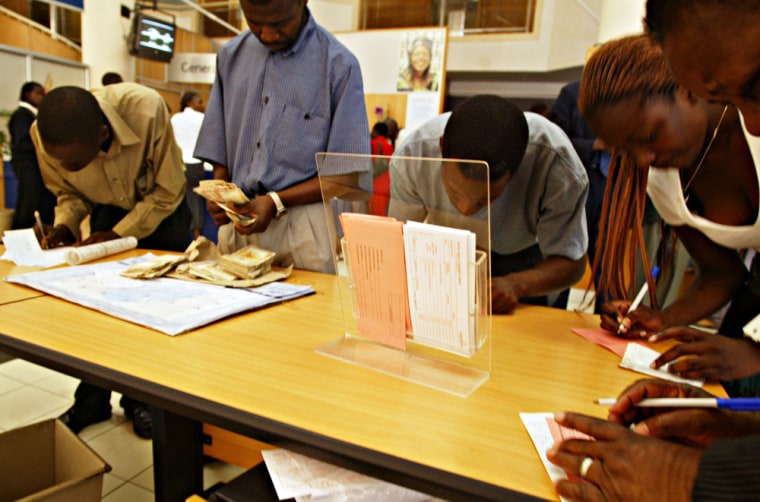Banks and stores did brisk business Monday on the last day the nation’s old bank notes were being accepted as legal currency.
The old notes become obsolete at the close of trading Monday, when a new range of bills, with three zeros struck off the old denominations, replaces them amid hyperinflation.
Long lines of customers formed in banking halls to exchange old notes for new as well as at automated teller machines recalibrated over the weekend to dispense new bills from personal accounts.
Stores and supermarkets reported a surge in last-minute buying of groceries and other goods to use up the old notes. Managers at one liquor and general store outside Harare said its sales tripled from its average weekend business.
But there were tensions as retailers ran out of new notes in small denominations to tender as change on bulk purchases and customers refused to accept old notes as change, executives of a main supermarket chain said.
Central bank governor Gideon Gono, the architect of the changeover, was out of the country on a trip to China where he was canvassing for investment and loans for the troubled economy under a so-called Look East policy.
The government has been increasingly isolated by Western nations after more than five years of political and economic turmoil that followed the often-violent seizures of thousands of white-owned commercial farms to transfer land to black Zimbabweans.
Attempts to normalize economy
Disruptions in the agriculture-based economy led to record inflation of nearly 1,000 percent, the highest in the world, and acute shortages of food and hard currency from exports and tourism, gasoline and essential imports.
Under the changeover rules, individuals were permitted to exchange a limit of 100 million old Zimbabwe dollars ($40) for new currency in a single transaction each week since Aug. 1.
Those attempting to exchange more than that or those found with more at police roadblocks across the country were required to prove they earned or received the money legally. Businesses were allowed to exchange 5 billion Zimbabwe dollars a week in old bills in what the central bank said were measures to prevent burgeoning money laundering and black marketeering in scarce goods.
Stores and businesses will be allowed to turn in old notes to the central bank through Tuesday.
The official media quoted Gono on Sunday saying their would be no extension to the changeover — though amid fears that isolated rural communities would be left with valueless savings, the central bank would take into account what he called “deserving cases and genuine cases that merit exceptional considerations” after the deadline.
